In Mediterranean cultures, the intertwining of family and community life plays a central role in both social interactions and health-related practices. Group exercise, often observed as a communal activity in Mediterranean societies, reflects a deep-seated tradition of fostering strong family ties and building robust community networks. These communal activities, supported by a background rich in cultural and historical significance, are not just about maintaining physical fitness but are also integral to social cohesion and well-being.
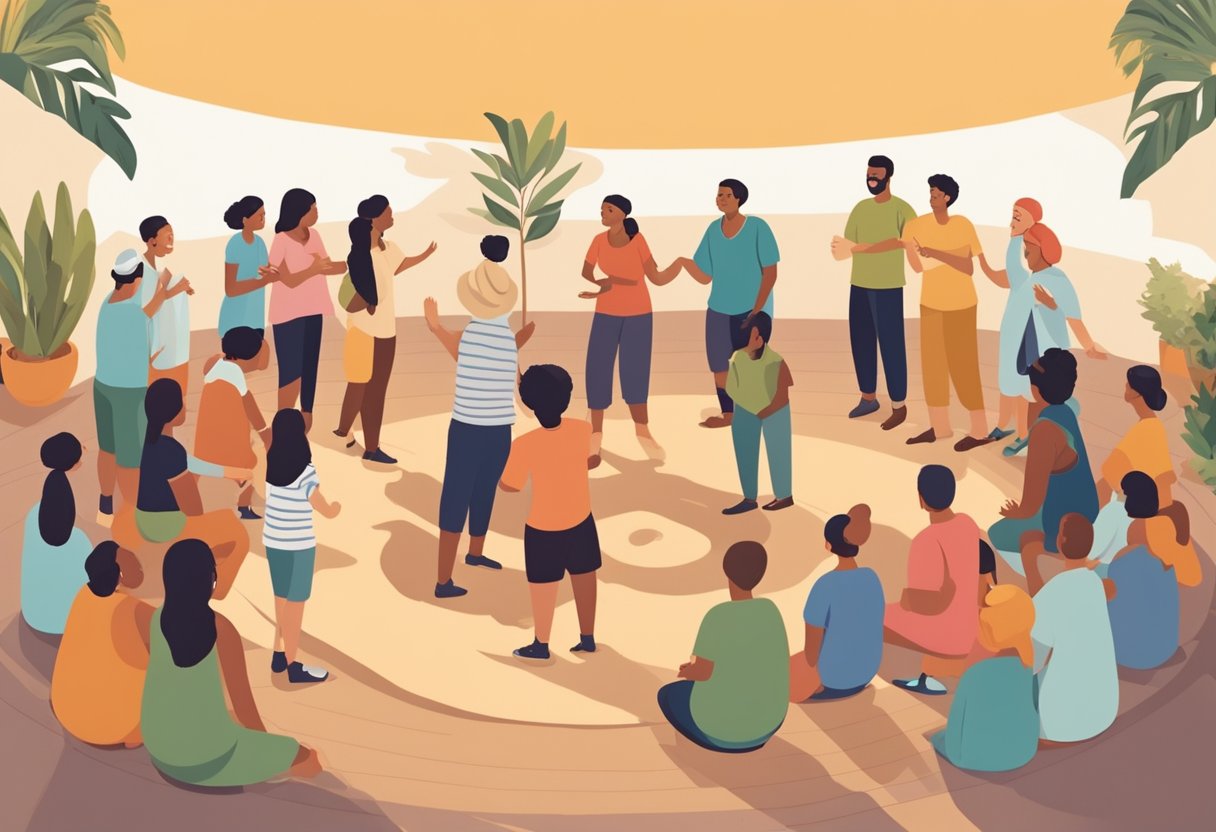
The Mediterranean diet, known for its health benefits, is also often a collective affair, with emphasis on fresh, locally-sourced ingredients that are naturally gluten-free and shared meals that reinforce social bonds. In this cultural context, group exercise goes beyond the individual, serving as a catalyst for sustaining dietary traditions, facilitating social interaction, and enhancing the overall quality of life. Engaging in physical activity as a group contributes to the adherence of the Mediterranean diet, as it brings people together to enjoy healthy living as a unified community.
Key Takeaways
- Communal activities in Mediterranean cultures strengthen familial and social connections.
- Group exercise in these societies supports a healthy lifestyle consistent with the Mediterranean diet.
- Shared physical activities foster a community’s adherence to traditional health practices.
Table of Contents
Cultural and Historical Context of Mediterranean Society
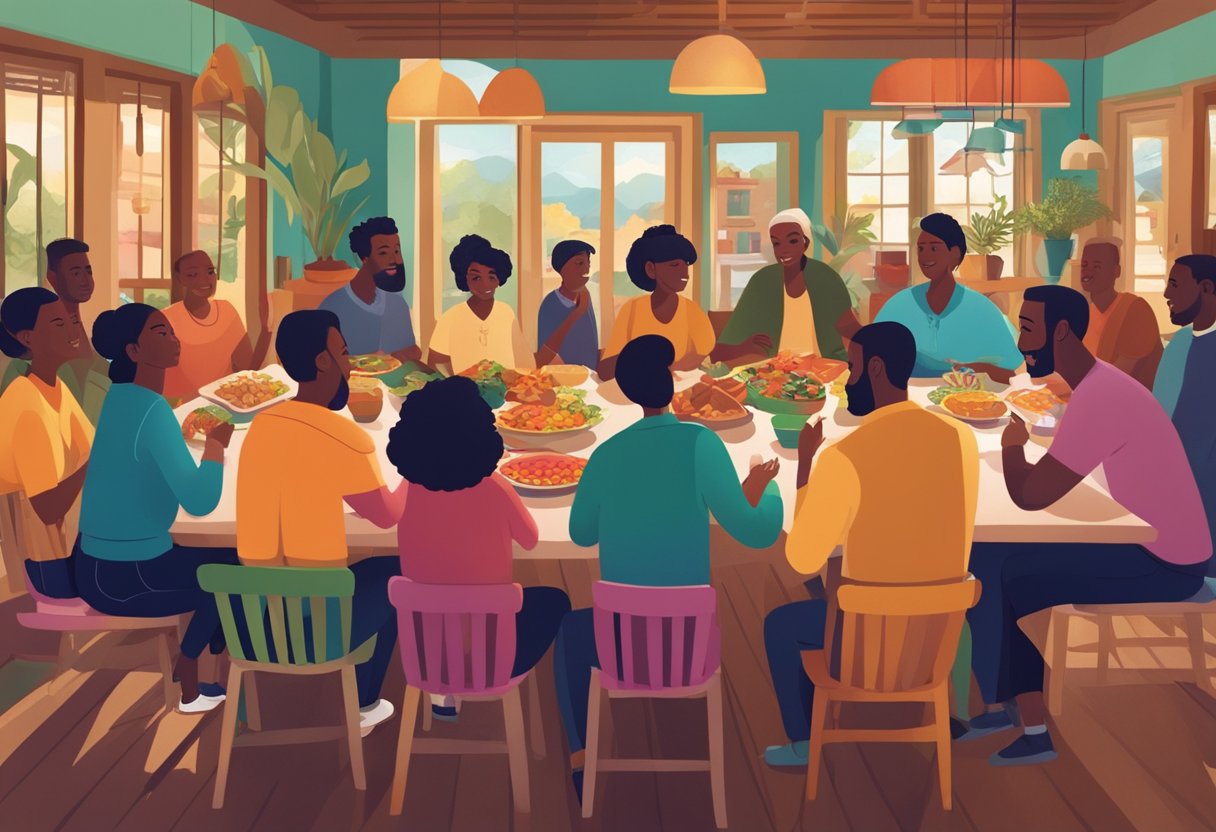
The Mediterranean basin is a geographical area with a rich tapestry of cultures and extensive historical significance. This region has been a melting pot for different civilizations, religions, and traditions, profoundly shaping its current cultural and communal characteristics.
Defining Mediterranean Culture
Mediterranean culture encompasses a diverse amalgamation of influences, including those from ancient civilizations like the Greeks and Egyptians. Philosophy, religion, and art from these societies have contributed to a distinct cultural identity. Major religions such as Christianity and Islam have also played significant roles in shaping societal norms and practices. Mediterranean culture is known for its strong emphasis on family bonds and community relationships, which are reflected in daily life and numerous festivities.
The Role of Family and Community
Family and kinship relationships in Mediterranean societies are particularly robust and form the backbone of social structure. These connections extend into larger community-focused activities, highlighted by group exercises, shared meals, and communal celebrations. Rituals and traditions both reflect and reinforce the value placed on familial and community ties, many of which are centered around religious observances from Christian and Islamic practices.
Heritage and UNESCO Recognition
The Mediterranean’s rich cultural heritage is recognized by UNESCO, which has designated numerous sites and traditions within this area as World Heritage. These acknowledgment aim to preserve the historical legacies and cultural artifacts that exemplify the region’s contributions to humanity. Outstanding universal value is found in architectural works, historical cities, and intangible heritage, such as traditional music, dance, and festivities, all with roots deep in Mediterranean history.
Dietary Traditions and Practices
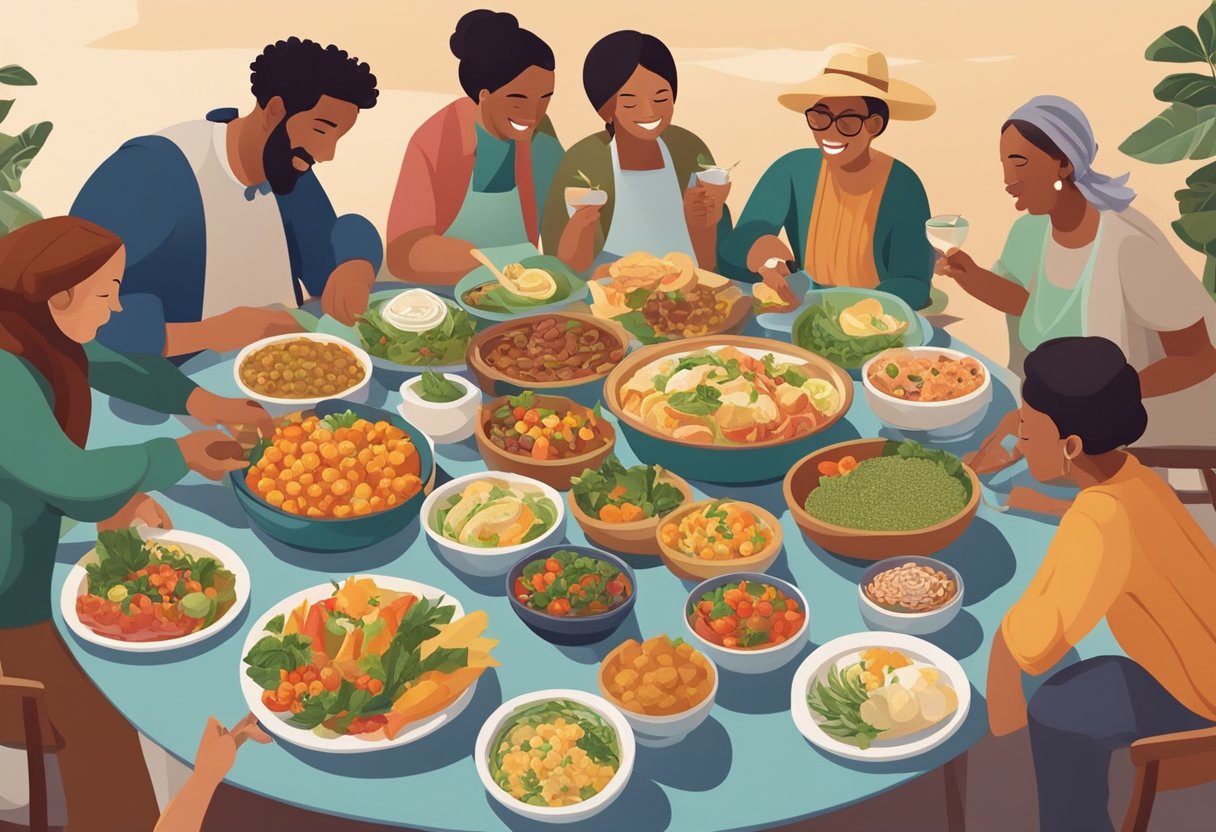
Within Mediterranean cultures, the union of traditional dietary habits and social practices forms the crux of communal living. These dietary traditions, characterized by the gluten-free Mediterranean diet, not only foster health but also strengthen community bonds through shared meals and agricultural rituals.
Mediterranean Diet and Its Components
The Mediterranean diet is notable for its emphasis on plant-based foods, whole grains, and lean proteins, predominantly fish. It incorporates a variety of foods rich in nutrients while maintaining a gluten-free approach. Key components of this diet include:
- Fruits and Vegetables: Fresh, seasonal produce is consumed in abundance.
- Whole Grains: Gluten-free options such as quinoa and millet are preferred.
- Lean Proteins: Fish and legumes are central to the protein intake.
- Healthy Fats: Olive oil is the primary source of added fat.
- Herbs and Spices: These are used to flavor dishes instead of salt.
Agriculture and Harvesting Techniques
Agriculture in Mediterranean regions is characterized by sustainable farming practices that emphasize the natural growing cycles of local produce. Harvesting techniques are often traditional and handed down through generations. For instance:
- Olives are handpicked or gathered using gentle shaking methods to prevent bruising.
- Grapes for wine are harvested based on optimal ripeness to ensure quality.
The utilization of these methods aids in the provision of fresh, gluten-free ingredients that are pivotal to the Mediterranean diet.
Culinary Rituals and Food Sharing
Cooking and eating together are fundamental aspects of Mediterranean cultures. Preparation and consumption of meals are seen as opportunities to strengthen family and community ties.
- Food Preparation: It is an inclusive activity where recipes are shared and taught.
- Commensality: Meals are often eaten in a group setting, promoting social interaction.
Gluten-free dishes are seamlessly integrated into these rituals, ensuring inclusivity for those with dietary restrictions. These shared experiences around food are essential to the fabric of Mediterranean society.
Group Activities and Social Facilitation
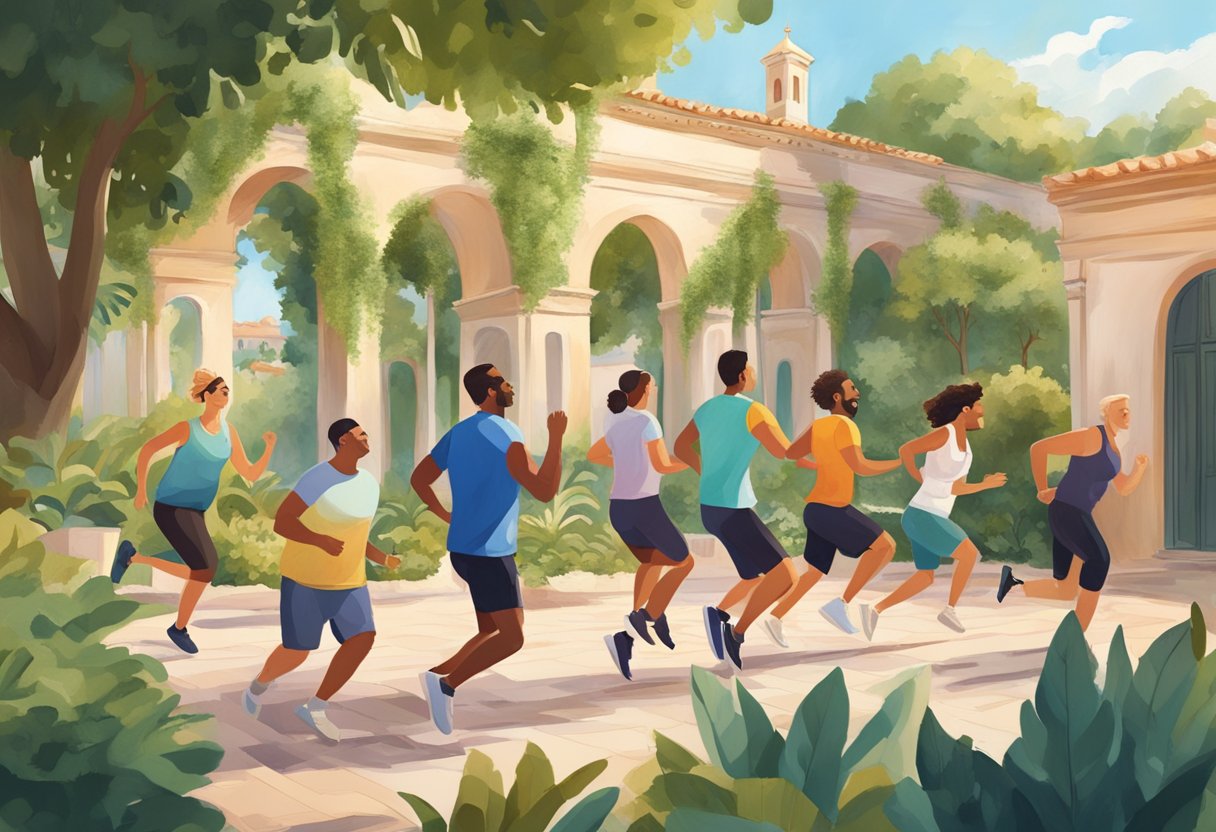
In the setting of Mediterranean cultures, group activities often extend beyond mere gatherings, becoming a foundation for building strong social ties and enhancing physical well-being through communal physical exercises, social support frameworks, and vibrant festivals.
Convivial Physical Activities
Mediterranean cultures emphasize enjoyment in activities, particularly when it comes to physical exercise. They often transform routine fitness into pleasurable social events, such as group-based physical activity, which has proven to be a means to reduce social isolation among older adults. Such activities are not only important for physical health but also for sustaining the social fabric of the community.
Social Support Networks
Families and close-knit communities form robust social support networks that play a crucial role in Mediterranean societies. These networks are essential for fostering an environment where individuals feel motivated and supported to maintain a healthy lifestyle, including adherence to a gluten-free Mediterranean diet for those with dietary restrictions.
Community Festivities and Celebrations
Community-wide festivities and celebrations are integral to Mediterranean culture, offering opportunities for all generations to engage, socialize, and participate in group activities. Whether it’s a local feast celebrating a patron saint or a traditional wedding, these events cultivate a sense of hospitality and belonging, underpinned by shared meals that cater to various dietary needs, including gluten-free options.
Health Implications of Group Behaviors

Group behaviors within Mediterranean cultures have significant implications for health outcomes. Traditionally, these behaviors facilitate adherence to dietary patterns and physical activities that contribute to overall well-being.
Diet Quality and Chronic Diseases
In Mediterranean societies, dietary habits are often communal, emphasizing the consumption of high-quality foods, such as fruits, vegetables, and whole grains. These foods are naturally gluten-free, catering to those with celiac disease or gluten sensitivity. Studies indicate that following a Mediterranean diet can play a role in the primary and secondary prevention of cardiovascular disease, as well as aid in the management of type 2 diabetes and obesity. Consuming a gluten-free Mediterranean diet can reduce the prevalence of chronic diseases associated with poor diet quality, including cancer and non-communicable diseases.
Mental Health and Community Engagement
Mediterranean cultures prioritize social interaction, often through shared meals and community gatherings. This community engagement is linked to improved mental health, with lower rates of cognitive decline and depression noted among the elderly. Engaging in community-based activities, including group exercise and shared meals, provides a support system that may buffer against life’s stresses, thereby fostering better mental well-being.
Impact of Social-ecological Model on Health
The social-ecological model recognizes the interconnected nature of individuals and their environments. In Mediterranean cultures, it manifests through the interplay between personal choices, societal norms, and environmental factors. This integrated approach can lead to the reduction of health inequalities as communal living allows for health-focused traditions to be maintained, which supports the management of diseases like type 2 diabetes and obesity. By leveraging the strengths of each layer of society – from family units to broader community structures – Mediterranean cultures help mitigate the impact of chronic diseases on public health.
Integration of Tradition and Modern Lifestyles
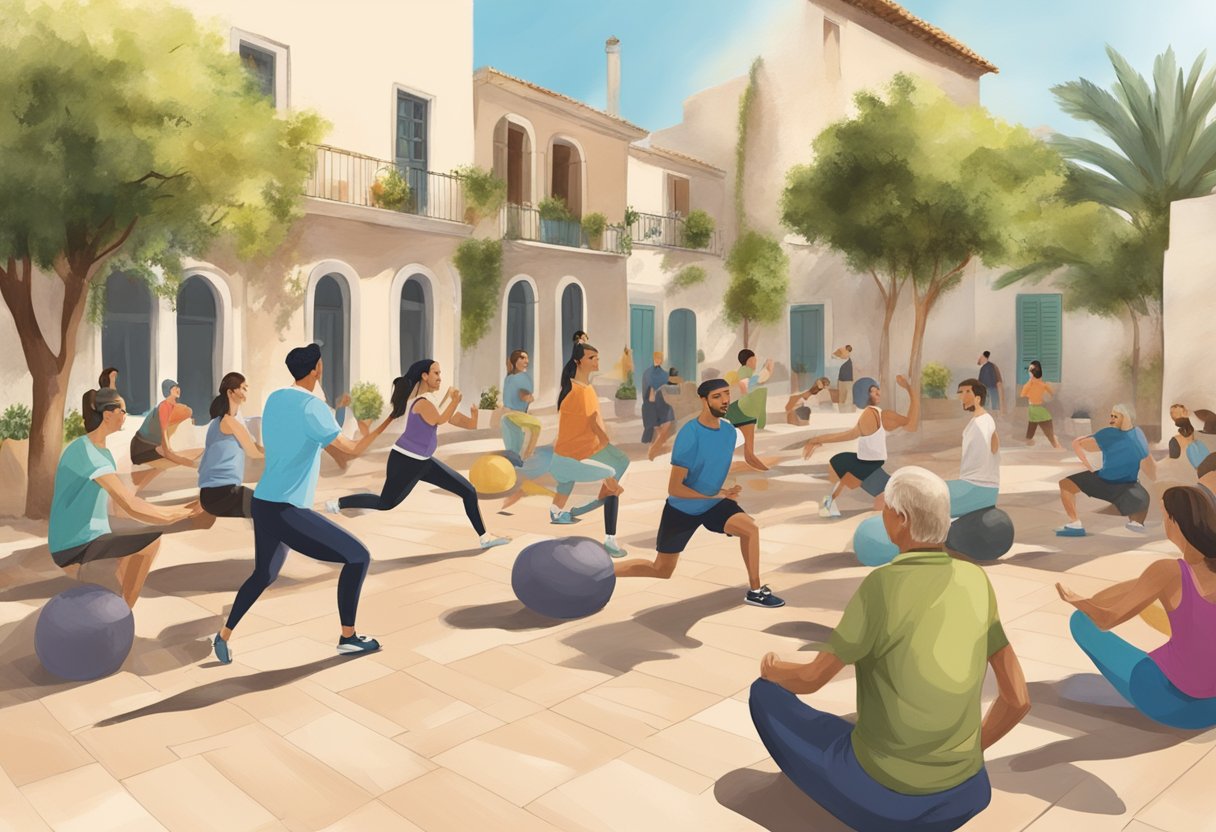
The Mediterranean region demonstrates a harmonious blend of time-honored customs and contemporary practices, particularly within family and community settings through group exercises. This fusion underscores the dynamic capacity to maintain a cultural legacy while embracing modern developments.
Balancing Technology and Heritage
In Mediterranean societies, technology serves as a tool for preserving and sharing traditional exercises and communal activities. For example, online platforms enable the younger generation to access instructions for traditional dances and family-oriented exercises. They balance this digital engagement with actual participation in local festivities and family gatherings, ensuring the continuation of their rich cultural heritage.
Adulthood, Aging, and Longevity
Adulthood in the Mediterranean brings forth an emphasis on active living that often extends into later years, contributing to enhanced longevity. Group exercises such as walking, dancing, and swimming are commonplace in communal spaces and are integral to daily routines. This lifestyle not only fosters physical health but also supports cognitive vitality among the aging population.
Sustainability and Dietary Adaptations
The Mediterranean lifestyle embodies sustainability through its diet, inherently adaptable to modern needs including gluten-free alternatives. Dishes are often prepared using a variety of gluten-free grains like quinoa and rice, alongside a cornucopia of fresh, local produce. The dietary choices within these communities are informed by seasonality and local availability, ensuring a minimal ecological footprint while respecting personal dietary requirements.
Research and Studies on Mediterranean Group Dynamics
This section focuses on how the Mediterranean region has contributed to our understanding of diet, health, and group behavior through a number of pivotal studies.
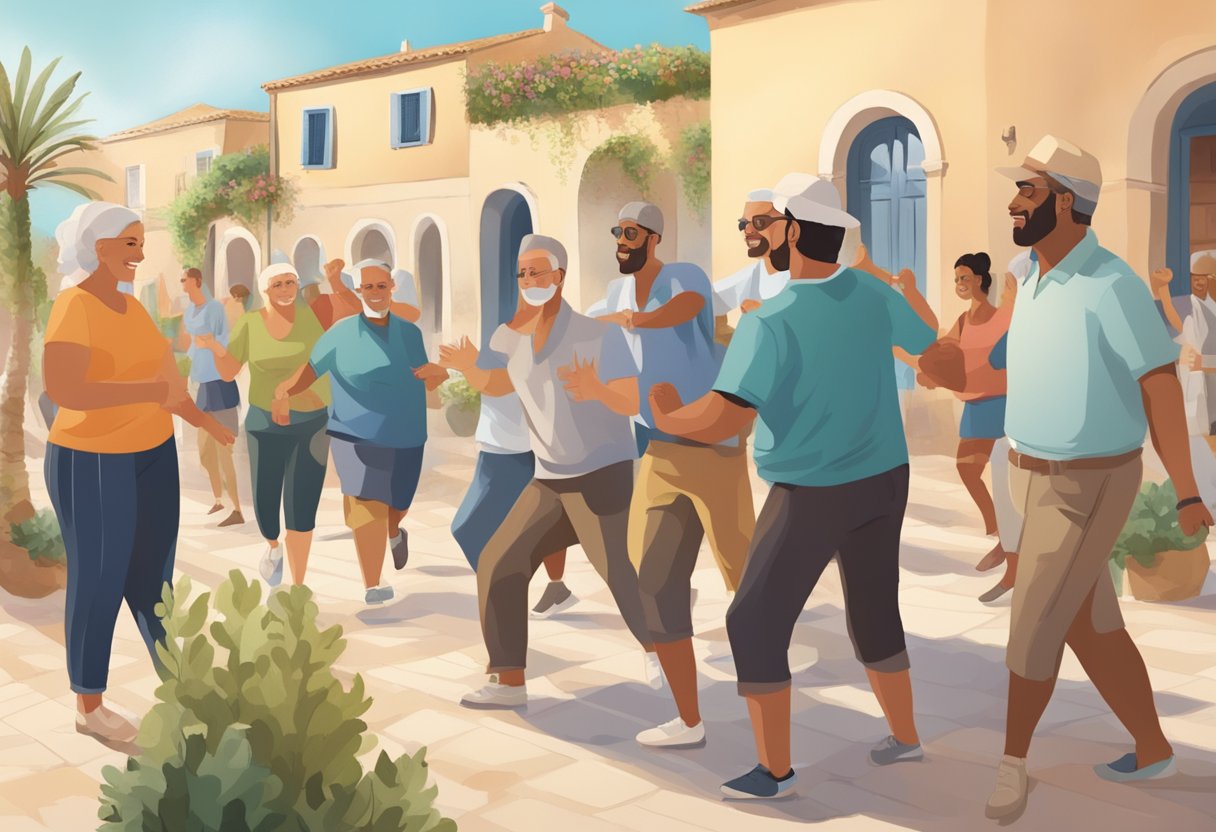
Analysis of the Seven Countries Study
The Seven Countries Study was a landmark cross-sectional research project assessing the relationships between lifestyle, diet, and the incidence of cardiovascular disease (CVD) across different populations. It highlighted the role of a Mediterranean diet in promoting heart health, observing lower rates of CVD in Mediterranean populations, which was associated with their dietary patterns and group lifestyle dynamics.
Behavioral Theories and Mediterranean Practices
Mediterranean cultures have provided a real-world application for the Theory of Planned Behaviour. This theory explains how social norms, attitudes, and control beliefs shape behaviors. Within the Mediterranean context, community-focused meal preparation and consumption practices contribute to sustained behavior change and improved diet quality.
Evidence from Randomised Controlled Trials
Recent randomised controlled trials have lent scientific support to the anecdotal evidence on the efficacy of group-based dietary interventions. For instance, studies have found that group adherence to a Mediterranean diet correlates with a notable reduction in CVD risk factors. These findings underscore the importance of group dynamics in the successful adoption of healthful dietary patterns.
Cultural Exchange and Evolution
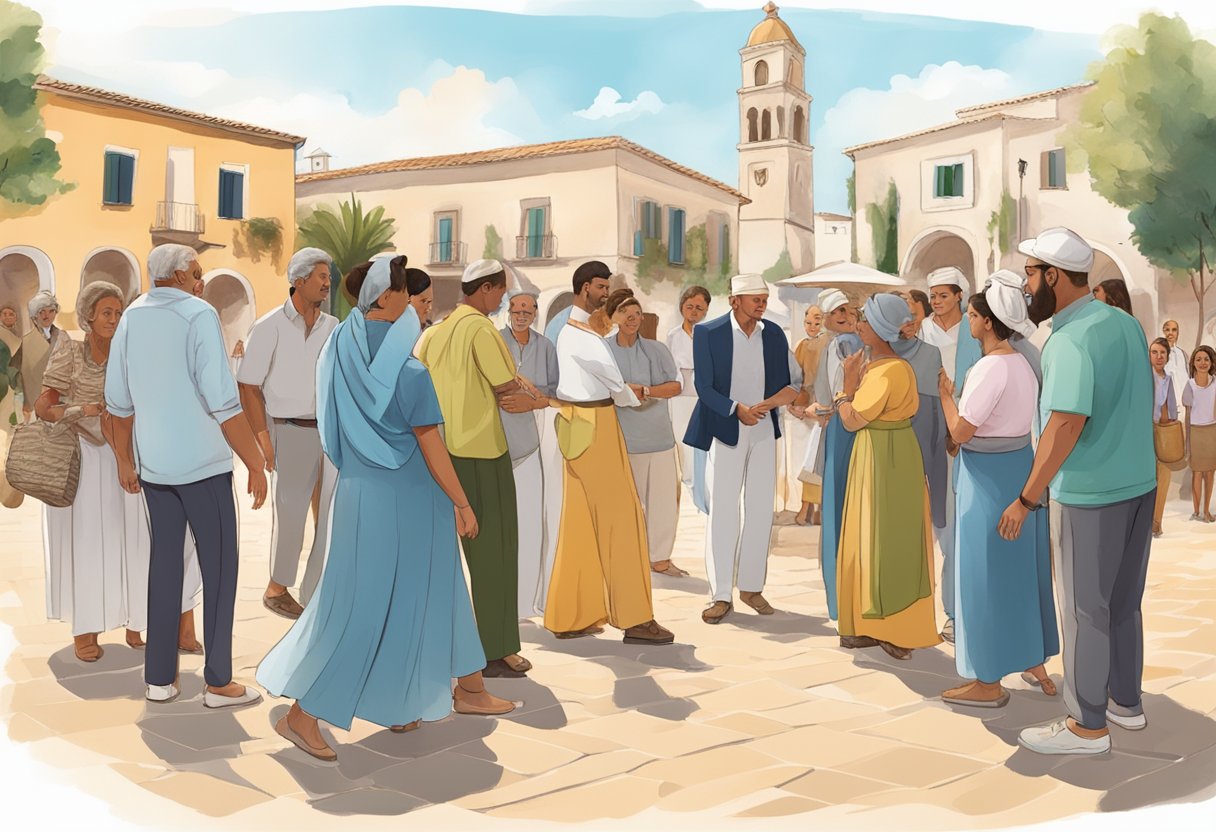
The intersection of diverse cultures in the Mediterranean basin has spurred a dynamic exchange and evolution of traditions, including how communities engage with physical activities as a group. Migration patterns and religious celebrations contribute significantly to intergenerational relationships within these societies.
Mediterranean Migration and Integration
Migration across the Mediterranean has led to a rich tapestry of cultures within local communities, notably in places like Sicily and Syria. As newer populations integrate, they often bring with them different exercises and sports, which meld with the local customs. This blending has birthed unique regional variations of fitness practices that emphasize conviviality and adaptation, reinforcing the social fabric of Mediterranean societies.
Religious and Cultural Festivities
Festivities in the Mediterranean frequently embody the heritage and religious beliefs of the community. They showcase a variety of activities, from dance to competitive sports, where physical expression is intertwined with spiritual and cultural factors. Participation in these events often spans generations, fostering a connection that is both rooted in tradition and indicative of societal evolution.
Understanding Intergenerational Relationships
In the Mediterranean, family and societal roles are deeply influenced by heritage and the shared experience of community exercise. The integration of different age groups in physical activities is a reflection of these societies’ emphasis on intergenerational relationships. As elderly family members pass down traditions, they impart values of religion, community, and collective well-being, which are central to Mediterranean life.
Social Aspects and Normative Behavior

In Mediterranean societies, the fabric of community life is often intertwined with activities that promote health and well-being. Among these, group exercise leverages social norms and the philosophy of conviviality to encourage physical activity and healthy eating, such as adherence to a gluten-free Mediterranean diet.
Influence of Social Norms on Health
Social norms in Mediterranean cultures significantly impact both physical activity and dietary habits. The importance placed on social support and motivation is evident in the way communities engage in group exercises, where individuals often find themselves more committed to staying active due to the collective enthusiasm and accountability. For example, participating in a dance class with friends or a shared evening walk not only provides a social outlet but also reinforces the norm of regular physical activity. This behavior, combined with a gluten-free Mediterranean diet—rich in fruits, vegetables, whole grains, and lean proteins—without the inclusion of gluten-containing grains—fosters a supportive environment for maintaining a healthy lifestyle.
The Philosophy Behind Mediterranean Conviviality
The philosophy underlying Mediterranean conviviality places a high value on community interactions and joyful gatherings. It is within this context that exercise and shared mealtimes become more than just routine; they are opportunities for cultural expression and communal bonding. Conviviality integrates the preparation and consumption of gluten-free meals as part of a holistic approach to health, encompassing both the philosophy and social norms of the Mediterranean lifestyle. Here, the act of sharing a gluten-free meal after a group workout is not just about sustenance but serves as a powerful motivator for continuing these healthful practices. Through this, the philosophy of Mediterranean conviviality transcends the individual and becomes a collective expression of well-being.
Frequently Asked Questions
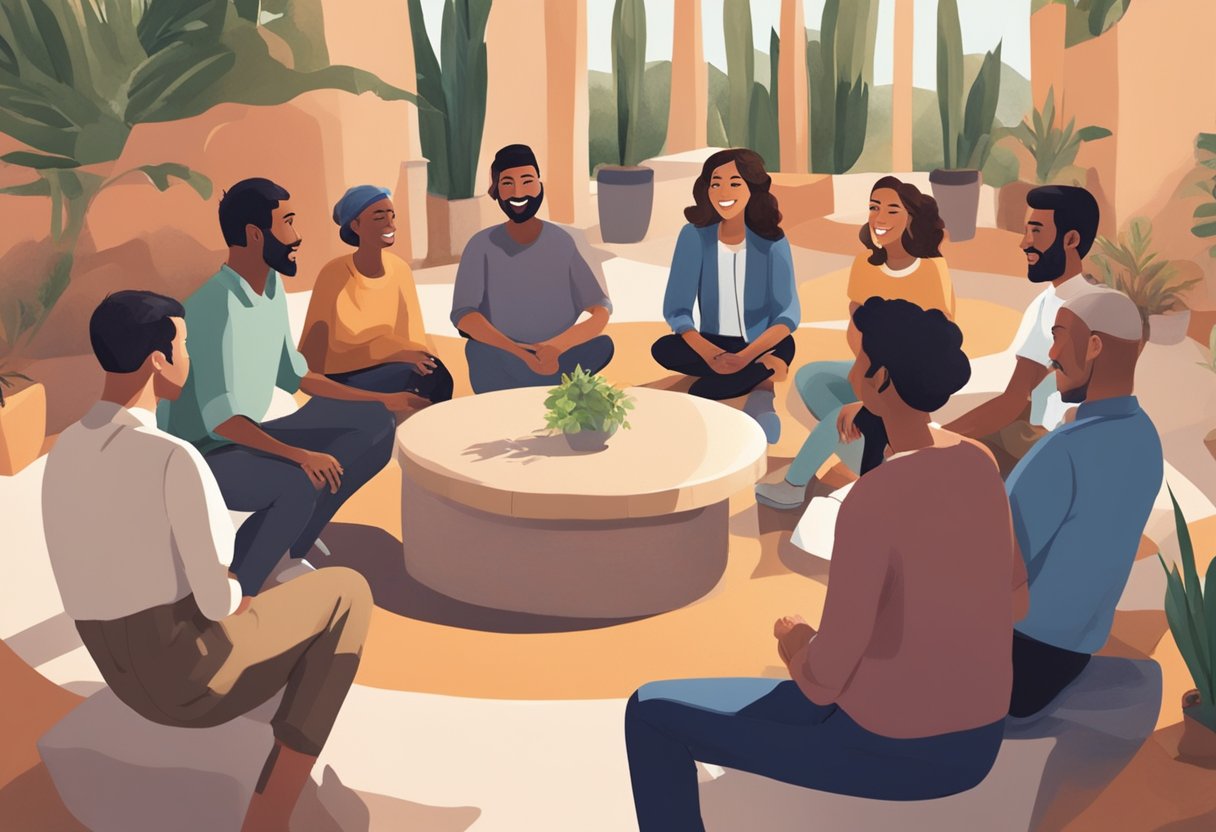
The following questions delve into the specific roles, traditions, and dietary habits that are characteristic of family and community life within Mediterranean cultures, with a particular focus on Greek society.
How did family structure and hierarchy operate in ancient Greek society?
In ancient Greek society, the family was structured with a clear hierarchy, usually headed by the oldest male member, known as the kyrios. He held legal authority over the household and responsibility for its members.
What role do family traditions and communal activities play in contemporary Greek culture?
Family traditions and communal activities continue to be the bedrock of contemporary Greek culture. They strengthen bonds, celebrate heritage, and involve shared meals that respect gluten-free dietary needs, a developing trend in modern times.
In what ways do gender roles within family units manifest in Greek culture?
Gender roles within Greek family units traditionally align with the patriarchal nature of the society, where men often take the lead in decision-making. However, these roles have evolved, with women sharing responsibilities and decision-making.
Can you describe the typical dietary habits embraced by families within Mediterranean cultures?
Families within Mediterranean cultures enjoy a diet rich in vegetables, fruits, legumes, and grains, often incorporating gluten-free options such as rice or quinoa. They use olive oil as the main fat source and consume fish and poultry in moderation.
What are some common expectations or experiences when someone marries into a Greek family?
When someone marries into a Greek family, they can expect to participate in various familial traditions, especially involving food and hospitality. Emphasis on sharing gluten-free meals during gatherings reflects both accommodation and inclusivity in dietary preferences.
How do parenting styles within Greek culture reflect on broader family values?
Parenting styles in Greek culture often emphasize respect, responsibility, and the importance of family unity. Parents instill these values in their children from a young age, alongside the understanding and practice of a healthy diet that can include gluten-free options.

